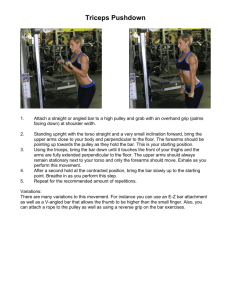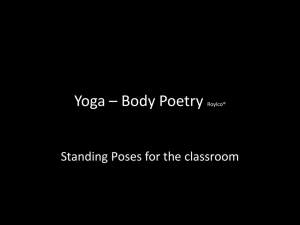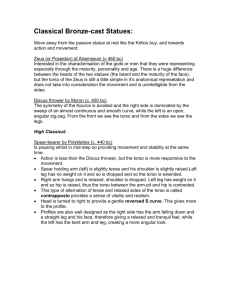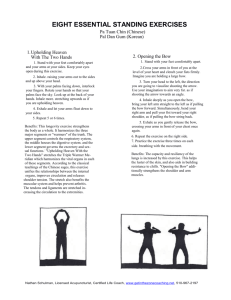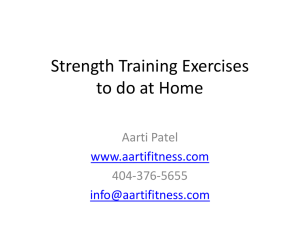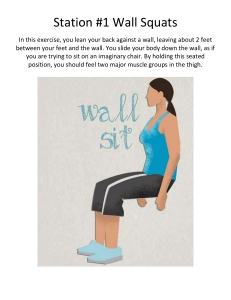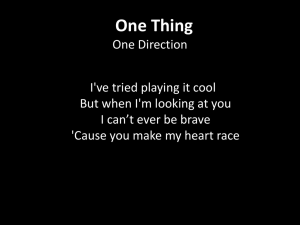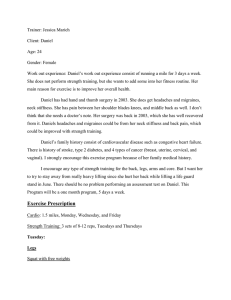Personal Fitness Project
advertisement
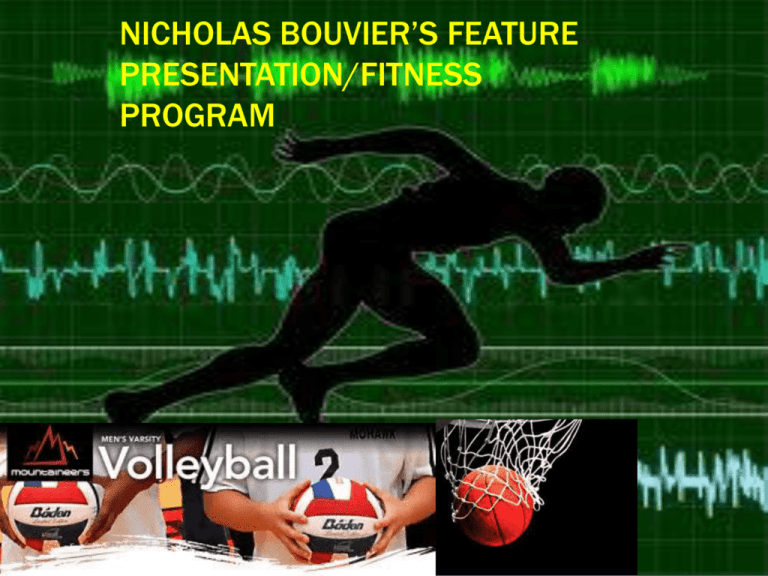
NICHOLAS BOUVIER’S FEATURE PRESENTATION/FITNESS PROGRAM F.I.T.T The F.I.T.T principle is, F= Frequency, I= Intensity, T= Time, and T= Type. My frequency is about 3 times a week, for about 20 minutes, I will have to improve on that and go for the long shot with 7 days a week, for an hour each day. I would push myself to the limit everyday until my bones can take no more pain. But, I will have to keep full oxygenated and keep on a healthy eating schedule. So that means, no chips, pop, or any other junk. I will have to work on my cardio a lot more than any other bone, or respiratory system, I would want to last long in my running, I enjoy running but I lose my breath to fast. TRAINING PRINCIPLES The training principles is the acronym of, “ROAR” which means Recovery, Overload, Adaption, and reversibility and detraining. When you stop training for over 3 weeks your body begins to lose it’s muscles, your lungs get weaker and you will be how you were before, you will have to begin re-training yourself all over again. You will have to keep on that schedule and never stop it. You will have to train your strength and cardio. I like to run a lot, but I have weak lungs. So I stick to the, “ROAR” method and that is my motivation to keep on pushing myself to the limit when I workout or sprint. REFERENCES http://www.bodybuilding.com/fun/workout/exercise.html Meal Day one Calo ries Meal Day One Calori es B Honey Nut Cheerios 130 B Nesquick Cereal 70 O 2% Milk 110 L 2 Pizza Pops 420 S Carrots, Pretzel, Celery 159 L Chocolate Pudding 120 L Ranch Dip 60 L Granola Bar 90 L 2 Pizza Pops 420 L 1 Wild Berry juice box 50 L One Wild berry Fruit 50 Juice S 1 blow pop 60 L Chocolate Pudding 120 S Fruit Juice Juice Box 114 L Granola Bar Chocolate Chip 90 D McDonalds Big Mac 200 D McDonalds Fries 510 D Large Coca-Cola 310 D/S Mcflurry Oreo 560 Total= 924 TRAPEZIUS (TRAPS) 1.GRASP A DUMBBELL IN EACH HAND WITH A PRONATED (PALMS FORWARD) GRIP THAT IS SLIGHTLY LESS THAN SHOULDER WIDTH. THE DUMBBELLS SHOULD BE RESTING ON TOP OF YOUR THIGHS. YOUR ARMS SHOULD BE EXTENDED WITH A SLIGHT BEND AT THE ELBOWS AND YOUR BACK SHOULD BE STRAIGHT. THIS WILL BE YOUR STARTING POSITION. 2.USE YOUR SIDE SHOULDERS TO LIFT THE DUMBBELLS AS YOU EXHALE. THE DUMBBELLS SHOULD BE CLOSE TO THE BODY AS YOU MOVE IT UP AND THE ELBOWS SHOULD DRIVE THE MOTION. CONTINUE TO LIFT THEM UNTIL THEY NEARLY TOUCH YOUR CHIN. TIP: YOUR ELBOWS SHOULD DRIVE THE MOTION. AS YOU LIFT THE DUMBBELLS, YOUR ELBOWS SHOULD ALWAYS BE HIGHER THAN YOUR FOREARMS. ALSO, KEEP YOUR TORSO STATIONARY AND PAUSE FOR A SECOND AT THE TOP OF THE MOVEMENT. 3.LOWER THE DUMBBELLS BACK DOWN SLOWLY TO THE STARTING POSITION. INHALE AS YOU PERFORM THIS PORTION OF THE MOVEMENT. 1.Take a pronated grip on a pull-up bar. 2.From a hanging position, raise yourself a few inches without using your arms. Do this by depressing your shoulder girdle in a reverse shrugging motion. 3.Pause at the completion of the movement, and then slowly return to the starting position before performing more repetitions. D E LTO I D S Attach a weight to a dip belt and secure it around your waist. Grab the pull-up bar with the palms of your hands facing forward. For a medium grip, your hands should be spaced at shoulder width. Both arms should be extended in front of you holding the bar at the chosen grip. You’ll want to bring your torso back about 30 degrees while creating a curvature in your lower back and sticking your chest out. This will be your starting position. Now, exhale and pull your torso up until your head is above your hands. Concentrate on squeezing your shoulder blades back and down as you reach the top contracted position. After a brief moment at the top contracted position, inhale and slowly lower your torso back to the starting position with your arms extended and your lats fully stretched. 1.STAND UP AND EXTEND YOUR ARMS STRAIGHT OUT BY THE SIDES. THE ARMS SHOULD BE PARALLEL TO THE FLOOR AND PERPENDICULAR (90-DEGREE ANGLE) TO YOUR TORSO. THIS WILL BE YOUR STARTING POSITION. 2.SLOWLY START TO MAKE CIRCLES OF ABOUT 1 FOOT IN DIAMETER WITH EACH OUTSTRETCHED ARM. BREATHE NORMALLY AS YOU PERFORM THE MOVEMENT. 3.CONTINUE THE CIRCULAR MOTION OF THE OUTSTRETCHED ARMS FOR ABOUT TEN SECONDS. THEN REVERSE THE MOVEMENT, GOING THE OPPOSITE DIRECTION. Arm Circles Pull-up Decline push-up Lie on the floor face down and place your hands about 36 inches apart while holding your torso up at arms length. Move your feet up to a box or bench. This will be your starting position. Next, lower yourself downward until your chest almost touches the floor as you inhale. Now breathe out and press your upper body back up to the starting position while squeezing your chest. After a brief pause at the top contracted position, you can begin to lower yourself downward again for as many repetitions as needed. PECTORALIS MAJOR (PUSH-UP) LIE ON THE FLOOR FACE DOWN AND PLACE YOUR HANDS ABOUT 36 INCHES APART WHILE HOLDING YOUR TORSO UP AT ARMS LENGTH. NEXT, LOWER YOURSELF DOWNWARD UNTIL YOUR CHEST ALMOST TOUCHES THE FLOOR AS YOU INHALE. NOW BREATHE OUT AND PRESS YOUR UPPER BODY BACK UP TO THE STARTING POSITION WHILE SQUEEZING YOUR CHEST. AFTER A BRIEF PAUSE AT THE TOP CONTRACTED POSITION, YOU CAN BEGIN TO LOWER YOURSELF DOWNWARD AGAIN FOR AS MANY REPETITIONS AS NEEDED. TRICEPS 1.FOR THIS EXERCISE YOU WILL NEED TO PLACE A BENCH BEHIND YOUR BACK. WITH THE BENCH PERPENDICULAR TO YOUR BODY, AND WHILE LOOKING AWAY FROM IT, HOLD ON TO THE BENCH ON ITS EDGE WITH THE HANDS FULLY EXTENDED, SEPARATED AT SHOULDER WIDTH. THE LEGS WILL BE EXTENDED FORWARD, BENT AT THE WAIST AND PERPENDICULAR TO YOUR TORSO. THIS WILL BE YOUR STARTING POSITION. 2.SLOWLY LOWER YOUR BODY AS YOU INHALE BY BENDING AT THE ELBOWS UNTIL YOU LOWER YOURSELF FAR ENOUGH TO WHERE THERE IS AN ANGLE SLIGHTLY SMALLER THAN 90 DEGREES BETWEEN THE UPPER ARM AND THE FOREARM. TIP: KEEP THE ELBOWS AS CLOSE AS POSSIBLE THROUGHOUT THE MOVEMENT. FOREARMS SHOULD ALWAYS BE POINTING DOWN. 3.USING YOUR TRICEPS TO BRING YOUR TORSO UP AGAIN, LIFT YOURSELF BACK TO THE STARTING POSITION. 4.REPEAT FOR THE RECOMMENDED AMOUNT OF REPETITIONS. Bench Dips Weighted Bench Dips Biceps 1. Stand up straight with a dumbbell in each hand at arm's length. Keep your elbows close to your torso and rotate the palms of your hands until they are facing forward. This will be your starting position. 2. Now, keeping the upper arms stationary, exhale and curl the weights while contracting your biceps. Continue to raise the weights until your biceps are fully contracted and the dumbbells are at shoulder level. Hold the contracted position for a brief pause as you squeeze your biceps. 3. Then, inhale and slowly begin to lower the dumbbells back to the starting position. 4. Repeat for the recommended amount of repetitions. Dumbbell Bicep Curl Hammer curls Lie flat on the floor with your lower back pressed to the ground. For this exercise, you will need to put your hands beside your head. Be careful however to not strain with the neck as you perform it. Now lift your shoulders into the crunch position. OBLIQUES Bring knees up to where they are perpendicular to the floor, with your lower legs parallel to the floor. This will be your starting position. Butt ups Now simultaneously, slowly go through a cycle pedal motion kicking forward with the right leg and bringing in the knee of the left leg. Bring your right elbow close to your left knee by crunching to the side, as you breathe out. Go back to the initial position as you breathe in. Crunch to the opposite side as you cycle your legs and bring closer your left elbow to your right knee and exhale. Continue alternating in this manner until all of the recommended repetitions for each side have been completed. Air bike LATISSMUS DORSI (LATS) Wide-Grip Lat Pull down Muscle up 1.Grip the rings using a false grip, with the base of your palms on top of the rings. Initiate a pull up by pulling the elbows down to your side, flexing the elbows. 2.As you reach the top position of the pull-up, pull the rings to your armpits as you roll your shoulders forward, allowing your elbows to move straight back behind you. This puts you into the proper position to continue into the dip portion of the movement. 3.Maintaining control and stability, extend through the elbow to complete the motion Sit down on a pull-down machine with a wide bar attached to the top pulley. Make sure that you adjust the knee pad of the machine to fit your height. These pads will prevent your body from being raised by the resistance attached to the bar. Grab the bar with the palms facing forward using the prescribed grip. Note on grips: For a wide grip, your hands need to be spaced out at a distance wider than shoulder width. For a medium grip, your hands need to be spaced out at a distance equal to your shoulder width and for a close grip at a distance smaller than your shoulder width. As you have both arms extended in front of you holding the bar at the chosen grip width, bring your torso back around 30 degrees or so while creating a curvature on your lower back and sticking your chest out. This is your starting position. As you breathe out, bring the bar down until it touches your upper chest by drawing the shoulders and the upper arms down and back. Tip: Concentrate on squeezing the back muscles once you reach the full contracted position. The upper torso should remain stationary and only the arms should move. The forearms should do no other work except for holding the bar; therefore do not try to pull down the bar using the forearms. After a second at the contracted position squeezing your shoulder blades together, slowly raise the bar back to the starting position when your arms are fully extended and the lats are fully stretched. Inhale during this portion of the movement. ABDOMINAL MUSCLES (ABS) H O L D T H E Lie flat on your back with your feet flat on the ground, or resting on a bench with your knees bent at a 90 degree angle. If you are resting your feet on a bench, place them three to four inches apart and point your toes inward so they touch. Now place your hands lightly on either side of your head keeping your elbows in. Tip: Don't lock your fingers behind your head. While pushing the small of your back down in the floor to better isolate your abdominal muscles, begin to roll your shoulders off the floor. Continue to push down as hard as you can with your lower back as you contract your abdominals and exhale. Your shoulders should come up off the floor only about four inches, and your lower back should remain on the floor. At the top of the movement, contract your abdominals hard and keep the contraction for a second. Tip: Focus on slow, controlled movement - don't cheat yourself by using momentum. After the one second contraction, begin to come down slowly again to the starting position as you inhale. A B R O L L E R W I T H B O T H H A N D S A N D K N E E L O N T H E Crunches F L O O R . N O W P L A C E T H E A B R O L L E R O N T H E F L O O R I N F R O N T O F Y O U S O T H A T Y O U A R E O N A L L Y O U R H A N D S A N D K N E E S ( A S I N A K N E E L I N G P U S H U P P O S I T I O N ) . T H I S W I L L B E Y O U R S T A R T I N G P O S I T I O N . S L O W L Y R O L L T H E A B R O L L E R S T B O D Y I N T O A S T R A I G H T P O S I T I O W I T H O U T T O U C H I N G T H E F L O O R T H I S P O R T I O N O F T H E M O V E M E N R A I G H T F O R W A R D , S T R E T C H I N G Y O U R N . T I P : G O D O W N A S F A R A S Y O U C A N W I T H Y O U R B O D Y . B R E A T H E I N D U R I N G T . A F T E R A P A U S E A T T H E S T R E T C H E D P O S I T I O N , S T A R T P U L L I N G Y O U R S E L F B A C K T O T H E S T A R T I N G P O S I T I O N A S Y O U B R E A T H E O U T . T I P : G O S L O W L Y A N D K E E P Y O U R A B S T I G H T A T A L L T I M E S . Ab Roller Secure one end of the band to the lower portion of a post and attach the other to one ankle. Facing the attachment point of the band, hold on to the column to stabilize yourself. Keeping your head and your chest up, move the resisted leg back as far as you can while keeping the knee straight. Return the leg to the starting position <--Hip extension with bands--> START OFF BY LYIN G ON THE FLOOR. E XTE N D ON E LE G STRAIGHT AN D PULL THE OTHE R KN E E TO YOUR CHE ST. H OLD UN DE R THE KN E E JOIN T TO PROTE CT THE KN E E CAP. GE N TLY TUG TH AT KN E E TOWARD YOUR N OSE . SWITCH SIDES. THIS STRE TCHE S THE BUTTOC K S AND LOWE R BACK OF TH E BE N T LE G AN D THE HIP FLE XOR OF THE STRAIGH T LE G. ONE KNEE TO CHEST To begin, seat yourself on the bike and adjust the seat to your height Cycling offers convenience, cardiovascular benefits, and has less impact than other activities. A 150 lb person will burn about 280 calories cycling at a moderate rate for 30 minutes, compared to 450 calories or more running. <---Cycling ---> QUADRICEPS STAN D WITH YOUR FE E T SHOULDE R WIDTH APART. YOU CAN PLACE YOUR HAN DS BE HIN D YOUR H E AD. TH IS WILL BE YOUR STARTIN G POSITION . BE GIN TH E MOVE ME N T BY FLE XIN G YOUR KN E E S AN D HIPS, SITTIN G BACK WITH YOUR HIPS. CON TIN UE DOWN TO FULL DE PTH IF YOU ARE ABLE AN D QUICKL Y RE VE RSE THE MOTION UN TIL YOU RE TURN TO THE STARTIN G POSITION . AS YOU SQUAT, KE E P YOUR HE AD AN D CH E ST UP AN D PUSH YOUR KN E E S OUT . Body weight squats Place your sled on an appropriate surface, loaded to a suitable weight. The sled should provide enough resistance to require effort, but not so heavy that you are significantly slowed down. You may use the upright or the low handles for this exercise. Place your hands on the handles with your arms extended, leaning into the implement. With good posture, drive through the ground with alternating, short steps. Move as fast as you can for a short distance. <----Prowler Sprint ----> HAMSTRINGS 90/90 HAMSTRING Lie on your back, with one leg extended straight out. With the other leg, bend the hip and knee to 90 degrees. You may brace your leg with your hands if necessary. This will be your starting position. Extend your leg straight into the air, pausing briefly at the top. Return the leg to the starting position. Standing Dumbbell Calf Raises Stand with your torso upright holding two dumbbells in your hands by your sides. Place the ball of the foot on a sturdy and stable wooden board (that is around 2-3 inches tall) while your heels extend off and touch the floor. This will be your starting position. With the toes pointing either straight (to hit all parts equally), inwards (for emphasis on the outer head) or outwards (for emphasis on the inner head), raise the heels off the floor as you exhale by contracting the calves. Hold the top contraction for a second. As you inhale, go back to the starting position by slowly lowering the heels. CALVES Grab an exercise band and stand on it with your toes making sure that the length of the band between the foot and the arms is the same for both sides. While holding the handles of the band, raise the arms to the side of your head as if you were getting ready to perform a shoulder press. The palms should be facing forward with the elbows bent and to the sides. This movement will create tension on the band. This will be your starting position. Keeping the hands by your shoulder, stand up on your toes as you exhale and contract the calves hard at the top of the movement. After a one second contraction, slowly go back down to the starting position. Calves raises– with bands
